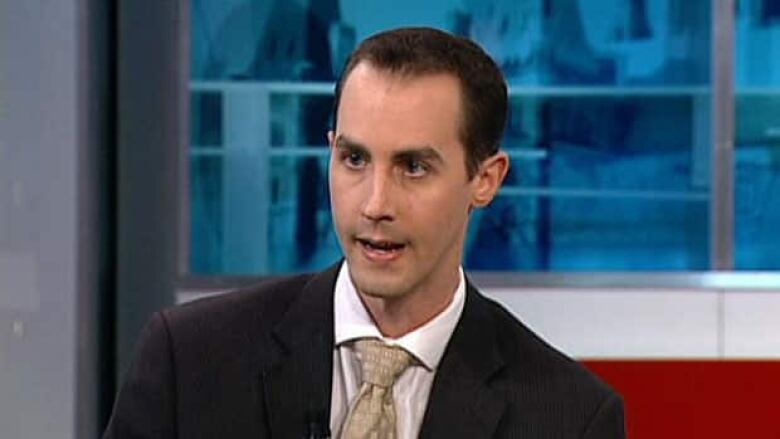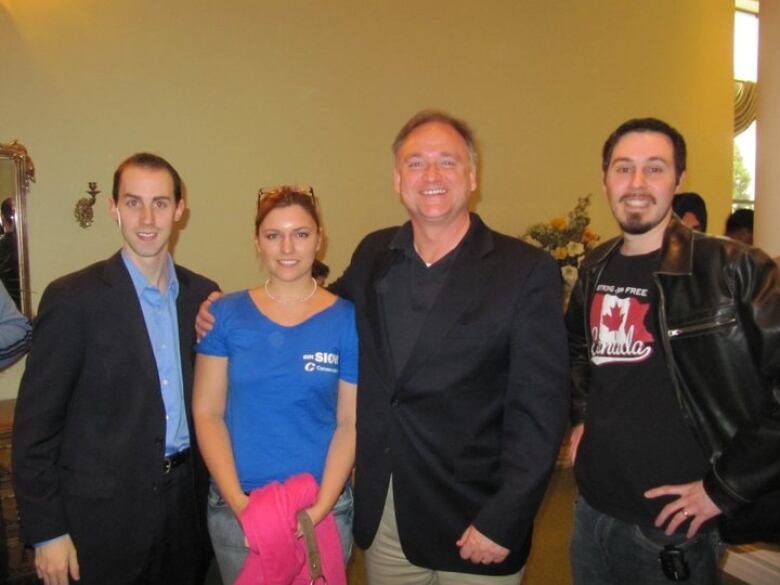Michael Sona, charged with Guelph robocalls, starts trial today
1 person charged in connection with automated call that misdirected voters in 2011 federal election

Three years ago, hundreds of voters in Guelph, Ont., got an automated robocall telling them that their polling station had moved. The female voice instructed them, in English and in French, to go to a downtown mall to cast their ballots. About 150 voters followed the instruction, only to find they had gone to the wrong place to vote.
Staff at the polling station said some of the voters stormed out; others ripped up their voter information cards.
Today, 25-year-old Michael Sona goes on trial for planning and executing that call. The former Conservative Party staffer, who was 22 at the time of the election, is the only person charged.
Sona has always said he had nothing to do with the call, butfaces up to five years in prison if he's convicted of the single charge ofwilfully preventing or endeavouring to prevent a voter from casting a ballot.
The Crown prosecutor,Croft Michaelson, is proceeding on the indictable offence rather than the less serious summary charge, which has a maximum penalty of one year in jail and a $2,000 fine (the indictable offence allows for a $5,000 fine as well as the five-year prison term).
It's clear that Elections Canada and the Public Prosecution Service wantto be seen to be taking the case seriously.
It's less clear whether Guelph's voters will know by the end of the trial who is responsible for the robocall that focused attention on a long-used political tool.
2-year probe

The riding had already seen its share of election controversy when Sona, the director of communications for Conservative candidate Marty Burke, allegedly grabbed for a ballot box at a polling booth set up at the University of Guelph campus. It was against the rules to set up a new polling station, but Elections Canada allowed the votes to be counted.
Sona says that's the reason his name was first leaked to the media as the person allegedly behind the plot.
Complaints about calls giving people the wrong polling station locations had already come in during the days leading up to May 2. Elections Canada was in touch with a lawyer for the Conservative Party to alert officials to the calls reported in towns from Newfoundland and Labrador to Winnipeg. (A report by Elections Canada later found that there wasn't enough evidence to support the idea of aco-ordinated campaign to suppress the vote across the country.)
Investigators spent months carefully tracingthe fake call display number,learning about automated calls and vanilla prepaid credit cards. A series of purchase records, none which seemed to reveal the culprit, allowed them to determine when and wherethe burner cellphone and untraceable credit cards had been purchased: in stores around Guelph twonights before the election.
It took nearly two years beforethe commissioner of Canada Elections laid a charge against Sona.
Who is 'Pierre Poutine'?
Much earlier in the investigation, court documents revealed the burner phone had been registered in the name of PierrePoutine.
It's possible Sona's lawyer will try to connect another campaign worker to the calls to present to the judge the possibility of a different Pierre Poutine.
The campaign's deputy campaign manager and IT worker, Andrew Prescott, signed an immunity agreement with the Crown that would seem to protect him from prosecution for whatever details he revealed to Elections Canada after signing it. Prescott was the campaign's main contact with RackNine, the company whose services were used to make the automatedcalls.But he emailed the private contact information for the owner of RackNine to Sona and Ken Morgan, Burke's campaign manager, the night that Pierre Poutine bought the burner phone and vanilla credit cards.
Given the immunity agreement, it's expected Prescott will testify against Sona, as will other Conservative campaign workers and current or formerParliament Hill staffers. Morgan, however, is not expected to be in Guelph to testify: he left to teach English inKuwait in the months following the election. Elections Canada investigators were never able to interview him.
The trial is set for eight days.












_(720p).jpg)


 OFFICIAL HD MUSIC VIDEO.jpg)
.jpg)



























































































